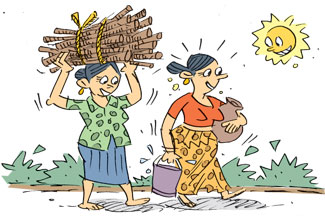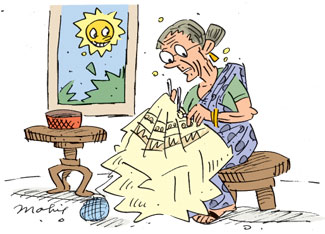|

by R. S. Karunaratne
What are conjunctions?
Basically conjunctions are words that join clauses into sentences.
I went to school early because I was extremely happy.
The clauses “I went to school early” and “I was extremely happy” are
joined by the conjunction ‘because.’
Conjunctions also show us how the meanings of the two clauses are
related.
Soma brought firewood and Sena supplied water.
|

Do you know the girl who is
talking to my boss? |
Ganga is poor but she is hard working.
You can be a lawyer or a notary public.
Everybody disliked him because he was rude.
I’ll give you Rs. 1,000 when I get my salary.
And but and ‘or’ are referred to as coordinating conjunctions as they
join pairs of clauses that are independent.
Champa works as a secretary and her husband is employed as a security
guard.
I earn a lot of money but I spend it for household expenses.
I might go to Kandy or proceed to Nikaweratiya tomorrow.
Some conjunctions are made up of two or more words.
Susila attended tuition classes so that she could pass the
examination easily.
Although conjunctions join two clauses into one sentence, sometimes
they can stand alone. This normally happens in answers.
A: When are you leaving for London?
B: When I get my visa.
B: Why did you hit Kamal?
B: Because he scolded me.
A conjunction can be used to state an afterthought.
Yes I stole the money. But I had no alternative.
One conjunction is enough to join two clauses.
Although I didn’t know the candidate, I cast my vote for him.
Father was tired after the all night pirith ceremony but he went to
office on the following day.
“As you know, I work very hard,” she said.
You know that she works hard.
|

Soma brought firewood and
Sena supplied water. |
‘Who, that, which are relative pronouns. But they also join clauses
like conjunctions.
Do you know the girl who is talking to my boss?
The house that was set on fire belonged to my brother.
The course which begins tomorrow will be held at the BMICH.
Other conjunctions:
‘Otherwise’ means ‘if not’ or ‘or else,’
You must come early: otherwise you won’t get a seat.
‘So’ precedes its clause.
Bus drivers were on strike so we took a cab.
“Therefore” is used instead of ‘so’ in formal English.
The buses were overcrowded, therefore we hired a taxi.
“Still” and ‘yet’ are used at the beginning of the clause they
introduce.
You are not educated still you can find work in a factory.
Comfortable cars are very expensive, yet people buy them.
‘For’ and ‘because’ are conjunctions having the same meaning.
However, ‘for’ has a more restricted use than ‘because.’
Because it was raining we took a cab. (For is not possible)
A: Why did you steal his purse?
B: I did it because I had no money. (for is not possible)
Match the words with their meanings
Following words are related to medicine. Try to match the words with
their meanings. Check your answers with the key.
1. Adam’s apple ...................
2. Adulteration ...................
3. AIDS ...................
4. Allopathy ..................
5. Alzheimer’s disease ..................
6. Amnesia ..................
7. Amputation ..................
8. Amputee ..................
9. Anaesthesia ..................
10. Anorexia .................
11. Anthropology ...................
12. Antibiotics ..................
13. Antidepressants ..................
14. Antidote ..................
15. Antiseptic ..................
16. Antivenom ..................
17. Arsenic ..................
18. Arthritis ..................
19. Attrition ..................
20. Audiology ...................
21. Autism ...................
22. Autopsy .....................
23. Avian influenza ....................
Meanings
A. An extremely contagious viral disease affecting wild birds and
domestic poultry. This is popularly known as “Bird flu.’
B. The examination of a dead body for diagnostic purposes.
C. A pervasive form of disordered child development characterised by
difficulties with social interaction and communication.
D. The scientific study of hearing.
E. The normal wear of tooth surfaces caused by friction.
F. Inflammation of one or more joints which swell, become warm to
touch, and are tender and painful on movement.
G. A poisonous metallic element present in preparations such as
herbicides and pesticides.
H. A serum prepared from animals injected with the venom of snakes
used as an antidote in cases of poisoning by snakebite.
I. Chemical substances that destroy or inhibit the growth of micro-
organisms.
J. A remedy that opposes, counteracts or neutralises the action of a
poi son.
K. Drugs used to manage depression.
L. All drugs that act against bacteria.
M. The study of humankind.
N. Lack of appetite for food.
O. Loss of sensation.
P. A person who has had amputation of one or more limbs.
Q. Removal of an appending part of the body, e.g. breast, or a limb.
R. Complete loss of memory.
S. A neurogenerative disorder of the brain that leads to loss of
memory.
T. Conventional medicine and health care.
U. Acquired Immune Deficiency Syndrome.
V. The addition of cheaper substances to food etc. in order
toincrease the bulk and reduce the cost, with intent to mislead
anddefraud the customer.
W. This is the laryngeal prominence in the anterior part of the neck,
especially in the adult male.
*********
[KEY]
1 (W), 2. (V), 3. (U), 4. (T), 5. (S), 6. (R), 7. (Q), 8. (P), 9.
(0),
10. (N), 11. (M), 12. (L), 13. (K), 14. (J), 15. (I), 16. (H), 17.
(G), 18. (F), 19. (E), 20. (D), 21. (C), 22. (B), 23. (A)
*********
Starters :
The present perfect continuous
tense
The present perfect continuous tense is formed by the present perfect
of the verb 'to be' + the present participle,
Affirmative
I have been working
(First person singular)
You have been working
(Second person singular)
He has been working
|

She has been knitting from morning. |
(Third person singular)
We have been working
(First person plural)
You have been working
(Second person plural)
They have been working
(Third person plural)
Negative
I have not been working
You have not been working
He has not been working
We have not been working
You have not been working
They have not been working
Interrogative
Have I been working?
Have you been working?
Has he been working?
Have we been working?
Have you been working?
Have they been working?
Negative interrogative
Haven't I been working?
Haven't you been working?
Hasn't he been working?
Haven't we been working?
Haven't you been working?
Haven't they been working?
The present perfect continuous tense is used for an action which
began in the past and is still continuing.
I have been learning French for two years, but I still cannot speak
fluently.
Have you been here for a long time?
The present perfect continuous tense can be used with or without a
time phrase.
We have been living here for thirty years.
The bank officer has been counting money since 9 a.m.
What have you been thinking?
Note: The present perfect continuous tense does not exist in the
passive.
A single action in the present perfect continuous tense continues up
to the time of speaking, or nearly up to this time.
He has been talking to me.
She has been knitting from morning.
We have been dancing since breakfast.
You have been asking me for money.
They have been waiting in the queue all this time.
The present perfect continuous tense can be used for actions and
situations which have just stopped, but which have present results.
A: You look tired.
B: Yes, I have been running.
Sorry I'm late. Have you been waiting long?
I must relax now. I have been exercising.
The present perfect continuous tense can be used for repeated
actions.
My fans have been calling me all day.
I have been dreaming a lot these days.
We use the present perfect continuous tense with words that refer to
a period of time continuing up to now.
The company has been spending a lot of money recently.
The beggar has been walking in the sacred city all this week.
She has been applying for jobs since December.
Aids to English
Study the following simple words and how they are used in English.
About
'About' is a preposition meaning "concerned with a particular subject
or person."
Mary talks about me all the time.
I am reading a story about a dog trying to find its master.
I have been thinking about you all these years!
Do you have any questions about the topic?
A: What's it about ?
B: It's about some prisoners in Russia.
On
'On' is a preposition about a particular subject.
This is a book on post-modernism.
Professor Dissanayake is giving a lecture on "History of newspapers."
Opinions differ on the origin of life.
He expressed his views on pesticides.
Note: We do not use 'on' to talk about books, films, or stories. It
is used for more serious subjects.
Or so
We use 'or so' after a number or amount to show that it may be a
little more or a little less.
A: How many students are there?
B: About a dozen or so .
A week or so later, they left the island.
Deal with
We use 'deal with' about serious subjects.
The film deals with terrorism.
Let the principal deal with the errant students.
Approximately
We use 'approximately' in formal writing. It is rarely used in spoken
English.
Approximately 40 per cent of the population are suffering from
diabetes.
Use 'about' or 'around' in other contexts. 'Around' is especially
used in American English.
The school is about two kilometres away.
He is about 50 years.
Can you meet me about 9 a.m.?
The car cost me around Rs. 400,000.
Accept and take
'Take' is more informal than 'accept'
She decided to accept the job. (Formal)
She decided to take the job. (Informal)
A: The college has offered me a teaching post.
B: I think you should take it.
He repaired the car but refused to take any money.
Do you accept credit cards?
He was accused of accepting bribes.
People do not accept what some politicians say. |

